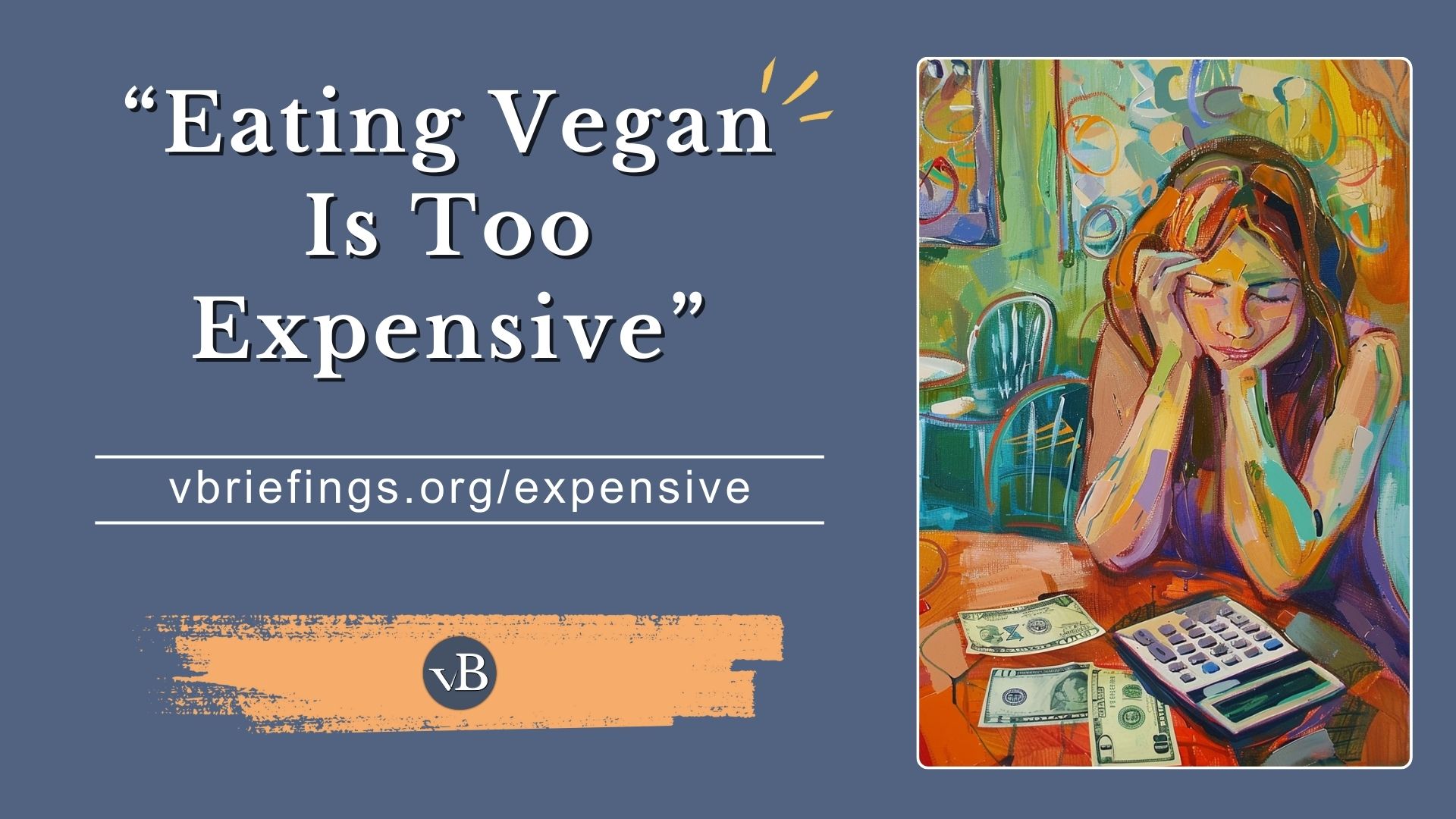Preface
Briefing description and more.
We examine the claim that eating vegan is too expensive and a luxury.
Companion Videos
How to use companion videos
Videos may be posted on multiple social media platforms, and you can share them on each platform according each platform’s conventions.
Share this Briefing
Social Media Sharing Image
This image will be used when sharing the briefing on a social media platform. You can see all social sharing images in the grid view.

How to share this briefing
Click on the icon for the platform on which you wish to share. What happens next depends on the platform, but generally a popup will appear, letting you add your own text as you share.
Briefing Meta
Metrics
Note: we will publish additional briefings after completing flashcards and presentation slides for selected briefings.
Counts:
| Main Text | |
| Key Points | 5 |
| Counterclaims | 0 |
| Supplementary | 5 |
| Further Study | 1 |
| Footnotes | 7 |
| Media & Advocacy | |
| Advocacy Notes | 11 |
| —Socratic Questions | 20 |
| Flashcards | 0 |
| Presentation Slides | 0 |
| Memes & Infographics | 0 |
| Companion Videos | 0 |
Other Meta:
Date Posted:
Last Edited:
Edit Log:
Key Points Links
Loading…
Help Us Improve
Please send your suggestions for improvements, or report any issues with this briefing to team@vbriefings.org
We appreciate that you are taking the time to help up improve. All suggestions and reports will be carefully considered.
Summary
A concise summary of the briefing (see below for citations).
Vegan diets are often more affordable than those including animal products, especially when staples like beans, rice, potatoes, and oats replace meat. Many common foods, such as grains, produce, and legumes, are naturally vegan, and while specialty items like plant-based meats can be pricier, they are unnecessary and becoming more affordable with growing demand. Additionally, veganism may reduce healthcare costs, with studies showing significant savings due to its health benefits. Even if veganism were more costly, the ethical imperative to minimize animal suffering provides a strong justification.
Context
Places this topic in its larger context.
Some have claimed that going vegan is expensive and, for some, unaffordable. The implication is that eating a vegan diet is a luxury that only the affluent can afford.
Key Points
This section provides talking points.
Vegan diets are often less expensive.
If you continue eating the same amount of fruit and greens but replace your meat with staples such as potatoes, beans, rice, oats, and corn, it’s hard to see how you would spend more.
Mayo Clinic considers lower costs to be one benefit of meatless meals. They say that “plant-based proteins offer many health benefits and can be less expensive than meat.”1
Registered dietitian Ginny Messina confirms, “replacing the meat, dairy, and eggs in diets with lower cost foods like grains, beans and tofu isn’t just frugal, it’s much more healthful.”2
Research bears this out:
- A study published in the Journal of Hunger & Environmental Nutrition concludes that even an economic version of a government-recommended meal plan costs $745 more per year than a plant-based meal plan.3
- A British Medical Journal study “estimated that diets including less animal and more plant foods were up to 25% to 29% less expensive than omnivorous diets.”4
- An extensive US Internet survey found that food expenditures for strict vegetarians were lower than for their meat-eating counterparts.5
- A major 2021 modeling study from the University of Oxford found that high-grain vegan diets were the most affordable for more developed countries, reducing food costs by 22–34 percent compared to current average diets, while also being healthier and more sustainable.6
Many foods cost the same.
You may be surprised to find that because many common foods in the grocery store are already vegan, your costs for these items won’t go up.
These include everything in the produce department, all bulk items (except jerky), most cereals, most breads, all grains and beans, most canned and frozen fruits and vegetables, most condiments, such as mustard, ketchup, pickles, relish, and sauces, and virtually all spices.
Vegan specialty foods are optional.
Some vegan items, such as burger patties and mayonnaise, are no more expensive. Vegan milks cost no more than organic, hormone-free cow’s milk. Vegan cheeses and meats can be more expensive but are becoming less expensive as demand increases.
Prepared foods will almost always cost more, vegan or not, and many of these foods you can make yourself for considerably less.
These processed foods are optional—you can choose to just leave them off the menu.
Your medical bills may decrease.
A study published by the National Academy of Sciences calculates a health-care savings of around $1,067 billion annually with a vegan diet.7 That’s over $3,000 for each person in the United States. Savings stem from the reduced need for medical care, as a vegan diet tends to decrease the likelihood of health issues.
Consider the cost to animals.
We are often willing to pay a premium for convenience, for products with a lower carbon footprint, and for designer brands.
Shouldn’t we be willing to pay a little more for items that don’t support, directly or indirectly, the breeding, enslavement, mutilation, and slaughter of sentient beings who have lives that are as important to them as our lives are to us?
Counterclaims
Responses to some yes but retorts.
Counterclaims are often not included in objection-type briefings because the objection itself functions as a form of counterargument.
Supplementary Info
Additional information that may prove useful.
Tips for Saving on Groceries
Buy in bulk and at farmer’s markets.
Shop seasonally.
Buy vegetables frozen, since they often cost less and are just as healthy.
Compare prices. A pound of green peas costs around $1.30 at Walmart, Trader Joe’s, and Whole Foods Market. The same pound of peas can be as high as $3.00 at other grocery stores.
Limit specialty foods, such as vegan meats and cheeses. They are unnecessary. While they may be more healthy than animal-based meats and cheeses, they are not as healthy as whole foods.
Further Study
Sources providing a deeper understanding of the topic or related topics.
Other Resources
This World of Vegan article provides a list of 30 affordable plant-based foods and recipes, demonstrating that eating vegan on a budget is both possible and nutritious.8
Advocacy Resources
Information to help with outreach and advocacy.
Note: we will publish additional briefings after completing flashcards and presentation slides for selected briefings.
Share This Briefing
Cloned from the Preface Section on page load.
Companion Videos
Cloned from the Preface Section on page load.
Memes and Infographics
No images found.
How to use Memes and Infographics
To sequence through all memes and infographics on this page, click on any image than use the arrow keys or the arrow buttons to show next and previous images.
To share a meme or infographic, right click on the image and choose download or save as. Then upload the image to the platform of choice.
Presentation Slides
Slides not available.
How to Use the Presentation Slides
You can view the slideshow full screen by clicking on the first link above.
To use Canva presenter mode, view the speaker notes, or download the slides as PowerPoint, login to Canva (the free account works) and follow the Full Canva Link provided above.
To copy this presentation to your own Canva project, use the Full Canva Link provided above, then select File->Make a Copy from the upper left. You can build your own unique presentation from multiple briefings by copying the presentation from each briefing and then building another presentation from the copied presentations.
Flash Cards
We partner with Brainscape because of their excellent features for learning. You will need to create a free Brainscape account to study the cards.
Go to Flash Cards: This will take you to a list of decks.
About Flash Cards and Brainscape
Flash cards are here to help you commit important facts and concepts in this briefing to memory.
In Brainscape, there is one deck for each briefing. You can study more than one deck at a time. Brainscape uses spaced repetition to promote memory retention. It is “the secret to learning more while studying less.”
You can study using your browser, but Brainscape also has a free mobile app that makes learning anywhere easy.
Socratic Questions
Socratic-style questions are embedded in the Advocacy Notes below, and shown in italics.
These are open-ended, thought-provoking questions designed to encourage critical thinking, self-reflection, and deeper understanding. They are inspired by the Socratic method, a teaching technique attributed to the ancient Greek philosopher Socrates, who would ask his students probing questions rather than directly providing answers.
The goal is to help people examine their beliefs, clarify their thoughts, uncover assumptions, and explore the evidence and reasoning behind their ideas.
Advocacy Notes
Tips for Advocacy and Outreach
General Tips
Many people believe veganism is unaffordable, often due to the misconception that it requires specialty foods. Your goal is to help them see that a vegan diet can be cost-effective, practical, and even more affordable than a diet including animal products.
Segue the Conversation Back to Animal Ethics
Even if veganism were more expensive, the ethical argument remains.
- “If eating vegan really were more expensive, would that justify harming animals?”
- “We’re often willing to pay more for convenience or luxury items—why not for a choice that prevents suffering?”
Why? This brings the conversation back to ethics, where it belongs.
Shift the Focus to Staples, Not Specialty Items
Many assume veganism is expensive because they think it requires costly plant-based meats and cheeses. Show them that whole plant foods are some of the cheapest options available.
- “If you replaced meat with staples like beans, rice, potatoes, and oats, do you really think your grocery bill would go up?”
- “Most of the world eats primarily plant-based because it’s cheaper—why do you think it would be different here?”
Why? This helps them realize that vegan diets are naturally budget-friendly when based on whole foods.
Highlight That Many Common Foods Are Already Vegan
People don’t realize how much of what they already eat is plant-based.
- “Did you know that fruits, vegetables, grains, beans, pasta, and most breads are already vegan?”
- “If your grocery list includes things like peanut butter, rice, and canned beans, then you’re already buying a lot of vegan food.”
Why? This reframes veganism as accessible rather than requiring a drastic change.
Challenge the Assumption That Meat and Dairy Are Cheaper
Many assume animal products are the most affordable option. Show them that plant-based staples are often far less expensive.
- “If a pound of dried beans costs a fraction of a pound of beef, why do people assume meat is the budget-friendly choice?”
- “Why does the idea of cost only come up when discussing veganism, and not when people buy expensive cuts of meat, seafood, or organic dairy?”
Why? This forces them to question whether cost is truly the issue or just an excuse.
Flip the Cost Argument Back on Them
People regularly pay more for convenience foods without thinking twice.
- “Do you think a home-cooked vegan meal with beans and rice costs more than a fast-food burger combo?”
- “People pay extra for organic and ‘humane’ meat—why not make a switch that eliminates cruelty altogether?”
Why? This shifts the focus to food habits rather than veganism itself.
Show That Medical Bills Are More Expensive Than Vegan Groceries
A vegan diet can lead to long-term health savings.
- “Would you rather spend a little more on healthy food now, or a lot more on medical bills later?”
- “If a plant-based diet lowers the risk of heart disease, diabetes, and high blood pressure, doesn’t that make it the smarter financial choice in the long run?”
Why? This connects health benefits to financial savings, making the argument more compelling.
Make It Personal and Relatable
Instead of debating studies, help them see how it applies to their own life.
- “If you replaced just one meal a day with a simple plant-based meal—like rice and beans—you’d probably save money right away.”
- “When I first went vegan, I thought I needed fancy plant-based meats, but I realized my grocery bill went down when I focused on simple foods.”
Why? This helps them see themselves in the solution rather than dismissing veganism as impractical.
Address the Reality That Prepared Foods Are Expensive No Matter What
People complain about the cost of vegan alternatives, but pre-packaged and fast foods are always pricey.
- “Have you noticed that pre-made meals and frozen dinners are expensive whether they’re vegan or not?”
- “If someone is spending $9 on a fast-food meal, does it really make sense to say eating vegan is too expensive?”
Why? This makes them question whether cost is the issue or just their habits.
Compare to Other Things They Willingly Pay More For
People justify paying extra for things they value.
- “People pay more for organic, free-range, or so called ‘humane’ meat—so if ethics matter, why not go all the way?”
- “Many people pay extra for sustainable products—why not extend that to food choices that reduce harm?”
Why? This makes ethical spending a natural extension of values they already hold.
Leave Them With a Thought-Provoking Question
If they resist, don’t argue—leave them with something to consider.
- “If I sent you some budget-friendly vegan meal ideas, would you be open to trying one?”
- “What’s one meal you eat a lot? I bet I can suggest a vegan version that’s cheaper.”
Why? A strong question stays with them long after the conversation ends.
Footnotes
Our sources, with links back to where they are used.
- “Meatless meals: The benefits of eating less meat,” Mayo Clinic, July 26, 2017. ↩︎
- Messina, Ginny. “The High Cost of Ethical Eating.” The Vegan RD, January 20, 2010. ↩︎
- Flynn, Mary M., and Andrew R. Schiff. “Economical Healthy Diets (2012): Including Lean Animal Protein Costs More Than Using Extra Virgin Olive Oil.” Journal of Hunger & Environmental Nutrition 10, no. 4 (October 2, 2015): 467–82. ↩︎
- Kahleova H, Sutton M, Maracine C, et al. Vegan Diet and Food Costs Among Adults With Overweight: A Secondary Analysis of a Randomized Clinical Trial. JAMA Netw Open. 2023;6(9):e2332106. ↩︎
- Lusk JL, Norwood FB. Some vegetarians spend less money on food, others don’t. Ecol Econ. 2016;130:232-242. ↩︎
- Springmann, Marco, et al. “The Global and Regional Costs of Healthy and Sustainable Dietary Patterns: A Modelling Study.” The Lancet Planetary Health, vol. 5, no. 11, Oct. 2021. ↩︎
- via Springmann, Marco, H. Charles J. Godfray, Mike Rayner, and Peter Scarborough. “Analysis and Valuation of the Health and Climate Change Co-benefits of Dietary Change.” Proceedings of the National Academy of Sciences 113, no. 15 (April 12, 2016): 4146–51. ↩︎
- Michelle Cehn, “Eating Vegan Meals on a Budget: 30 Affordable Plant-Based Foods.” World of Vegan, www.worldofvegan.com/eating-vegan-meals-on-a-budget-30-affordable-plant-based-foods/ 12 May 2024. Accessed 4 Oct. 2024.
↩︎




